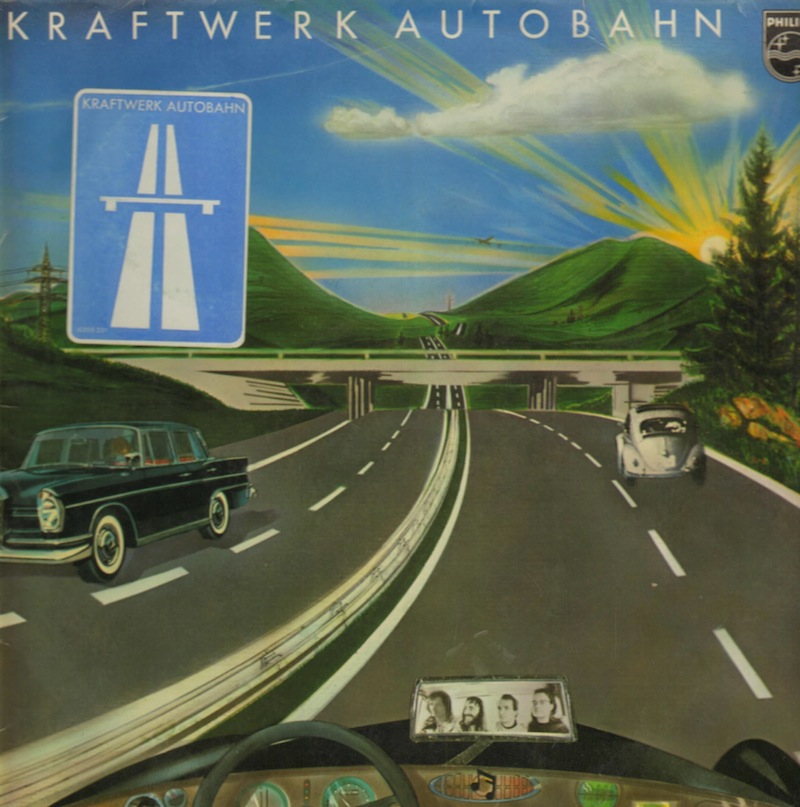Kraftwerk : Autobahn

The image that a band portrays is sometimes almost as important as the music itself. These images make indelible marks on the audience that are generally never forgotten. David Bowie made you love the alien, Madonna made you love the bride who probably shouldn’t be wearing white on her wedding day, the White Stripes made you love brother-sister duo that creepily hit on each other. But, as the aforementioned examples suggest, the image usually gets left to the wayside as soon as another better image comes along. Bowie became human, Madonna became British, the White Stripes were scandalously revealed to be, to the chagrin of incest enthusiasts everywhere, former spouses.
But these artists never really were what the image they embodied. It was just a trend for them, like acid wash jeans or parachute pants, could be cast aside when they were played out or deemed uncool. Kraftwerk, on the other hand, weren’t just playing the part. They truly were the persona they put on display, and everything about them, the way they dressed, their music itself, embodied it. Kraftwerk were robots. (Robots are a pretty sweet image to project unto their audience, if you ask me. The only thing that would possibly be cooler is pirates but in a to-the-death battle, robots would most definitely have the upper hand so it was probably a good choice on Kraftwerk’s part.)
The autobahn, for those not in the know, is a roadway system in Germany in which the driver can travel, for the most part, at any speed he or she desires. I was a passenger on the autobahn when I was about five, and while I don’t vividly remember the experience, I can picture my mother hurtling along in our maroon Honda with my brother and sister in tow and thinking that we were going entirely too fast. In my head, the soundtrack to this warp speed road trip (that probably wasn’t even that fast) is something with heart and spirit, great American road classics, like “Born to be Wild” (which is actually Canadian) or something equally as cliché. Down and
dirty, not cool and calm and certainly nothing like Kraftwerk’s “Autobahn.”
“Autobahn” is, in fact, a rather mellow tune, an emotion not generally associated with fast driving. It’s very constant in it’s approach. “Autobahn” sets out to be a song about, not the thrill of driving, but the monotony of it all. One would gather that, after experiencing enough science fiction, this Autobahn is how a robot would feel if said robot had the ability to drive. Stripped of all emotion, only to encapsulate the bare essentials of the ride. Despite wanting to project the feeling of monotony, “Autobahn” is never monotonous, all 22 minutes of it. The song seems to renew itself, as if new scenery is spotted just above the horizon.
Kraftwerk’s influence on the latter half the music of the Twentieth Century is staggering. Their use of synthesizers is as important as the day Les Paul decided it would be pretty cool to plug his guitar into an amplifier. Listen to a rather current song that uses electronics, if even in the slightest degree, and remove them and you are left with the dreary world of music that would not exist without Kraftwerk. An edited version of “Autobahn” was the first electronic song to reach “hit” status. With some lyrics about vampires or deceased actors added, the overtly dark “Mitternacht” could easily be a Bauhaus song. Any of the songs on Autobahn would feel right at home on the latter half of David Bowie’s Low. The robotics of Kraftwerk permeated their music to the highest degree. The beginning of Autobahn‘s closing track, “Morgenspaziergang,” for example, sounds almost like singing birds, if a computer were to imitate those birds. The robots of Kraftwerk found that music didn’t need to organic, it could be created artificially and yet still sound overwhelmingly beautiful.
Similar Albums/Albums Influenced:
New Order – Power, Corruption and Lies
David Bowie – Low
Juan McLean – Less Than Human

